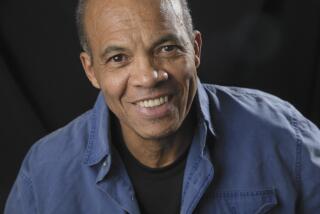Poets of the Balkan War
The politics, heroism and human anguish of war have fueled the language of many poets. In recent history, the Balkan War provided a backdrop for poets whose work reflected the horror or provided escape from it.
As part of the “Shaping the Great City” exhibition at the Getty Center, poets Christopher Merrill and Tomaz Salamun will read from their original work tonight. Slovenian poet Salamun has written 30 collections of poetry in his country. His last two books printed in English were “Feast” (Harcourt Brace, 2000) and “The Four Questions of Melancholy” (White Plains Press, 1997). Merrill, who translated “Feast” and edited “Melancholy,” is the author of three collections of poetry, including “Watch Fire,” and he made frequent trips to Yugoslavia in the 1990s. He directs the International Writing Program at the University of Iowa.
Question: What was it like to visit Sarajevo during the siege?
Answer: I made many visits there during the siege, which I write about in “Only the Nails Remain.” I was there for a war congress that they held. There was a short-lived program to bring in someone to give lectures to the students studying English literature. It turns out I was the sole person to do that because around the time of my last lecture Sarajevo University was shut down because of heavy shooting around the entrance to the faculty of philosophy.
Q: Did you see any of the conflict there?
A: Yes, the siege lasted four years. There was no gas, water or electricity. Anyone was a potential target any moment of the day, so I wrote a chapter in the book which details what it is like to be in the basement while it’s getting shelled.
Q: What is your opinion about that conflict?
A: The central tragedy of the post-Cold War world . . . was that it was played out in Europe in full view of everyone in the world. Journalists were there reporting. To live in a cosmopolitan city like Sarajevo when it was reduced to a medieval standard of life was criminal.
Q: In America . . . many of us tend to think that all war-torn places are the same.
A: I wrote a chapter about the Sarajevo Film Festival. This was a place that prided itself on seeing the latest films, listening to the latest music. They had to show the films on a diesel-generator-powered VCR at a theater where the Serbs liked to shoot the people going in the entrance. There was never less than 400 people at these films! They were so desperate to hold up the values of civilization, and that’s what I wanted to try to write about.
Q: Did your interest in that country come about because of your work with Tomaz?
A: I had translated a book of poems by his great friend and countryman, Ales Debellejk and he had invited me to walk across Slovenia--the idea being two poets walking in the woods of this beautiful little republic of Yugoslavia. You could walk across the republic in two or three weeks, and I wanted to write a book about that. Of course, by the time I got there the war was on. One of the first people I met was Tomaz, and I was able to begin to work with him translating his poems.
Q: What did you think about the fact that there was no poetry at President Bush’s inaugural?
A: (Laughing) You remember that both Clinton and Carter had poets read at their inaugurals!
One of the interests I had about traveling to Yugoslavia and writing about it was that it is a place where poets are taken seriously. The joke goes that if you’re in a room in Slovenia with four people, the odds are that three of them are poets.
What intrigued me was the important role poets there play in politics. Remember that the man who orchestrated the siege, the self-styled president of the Bosnian Serbs, was a poet who came to the U.S. to study on a Fulbright scholarship. The poets had strong roles both for good and for ill there, so it was intriguing for an American poet to be in a place where the words of a poet were taken seriously. I think it’s safe to say that in America, they are almost never taken seriously.
Q: Unless the poet is Eminem.
A: Who?
Q: Eminem, the controversial rap artist.
A: That’s not poetry in the conventional sense, but there are rap artists who use a lively language to address the pressures and events of the day. They may not be my cup of tea, but then again, the poets I translate from the Balkans are not the cup of tea of most Americans either. I’m all for using the language in a refreshing way. I just happen to be more interested in poems that live and breathe on the page.
Q: Can a poet make a living today in America without teaching?
A: No. That’s why I wrote books of prose. The only poets who ever made a living were the court poets of the Renaissance.
* Poetry Reading, 8 tonight, J. Paul Getty Museum, 1200 Getty Center Drive, Brentwood; free (parking is $5). Reservations: (310) 440-7300.
More to Read
The biggest entertainment stories
Get our big stories about Hollywood, film, television, music, arts, culture and more right in your inbox as soon as they publish.
You may occasionally receive promotional content from the Los Angeles Times.










